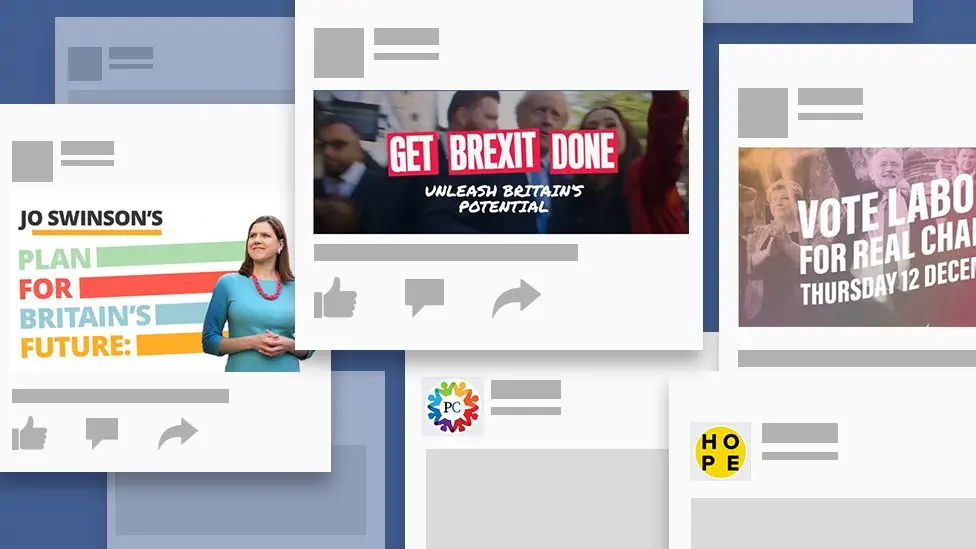Google to restrict political adverts worldwide
 BBC
BBCGoogle is extending a ban on political campaigns targeting advertising at people based on their supposed political leanings.
It said political groups would soon only be able to target ads based on "general categories" such as age, gender and rough location.
This restriction is already in place in the UK and the rest of the EU but will be imposed worldwide on 6 January 2020.
That could have big implications for next year's US Presidential vote.
The firm said it would also clarify under what circumstances it would remove political ads for making "false claims".
For example, Google would remove ads that falsely claimed that a candidate had died or that gave the wrong date for an election.
However, it would not ban claims that you cannot trust a rival party, for instance, which would be viewed as being a matter of opinion.
A spokeswoman told the BBC the new guidance would be provided within a week.
Google's approach to deliberately misleading statements puts it at odds with Facebook.
Mark Zuckerberg said his social network would not fact-check advertising from political candidates or campaigns, although it has since stressed that this does not amount to a totally hand-off approach.
"We prohibit misinformation about voting and do not allow ads which contain content previously debunked by our third party fact-checkers," said a spokesman.
"As we've said, we are looking at different ways we might refine our approach to political ads."
Twitter, meanwhile, has said it would disallow political advertising altogether.
Google’s new policy puts it somewhere roughly in the middle, suggesting a hands-off approach, with only the the most obvious misinformation being acted upon.
“We recognise that robust political dialogue is an important part of democracy, and no one can sensibly adjudicate every political claim, counterclaim, and insinuation,” said Scott Spencer, Google’s head of product management for Google Ads.
"So we expect that the number of political ads on which we take action will be very limited - but we will continue to do so for clear violations.”
The databases explained
A decision to impose a global ban on political campaigns matching their own databases of prospective voters against Google's user base is set to have major ramifications ahead of next year's US Presidential election.
Until now, strategists could use this to target individuals across platforms such as YouTube and Google Search.
Based on a user’s browsing habits - such as what news websites they frequent - Google makes an assumption about whether that user has left- or right-leaning political views.
In the US - but not in other countries, including the UK - political campaigns had the option to target people based on their political leaning.
It was however possible for campaigns in other countries to upload their own lists of contact details - a database of party members, for example - to Google, which would then match it with users on its service so ads could reach those people directly.
This will no longer be allowed.
"It will take some time to implement these changes,” Mr Spencer added.
Campaigns, like any other advertiser, can still place ads against specific types of content - such as videos about football or articles on the economy - Google said.
Any action taken against advertising deemed to be against its polices will be logged on Google’s Transparency Report section.
Details about deleted ads will appear on the page, but not the advertisement itself. Google said this data would remain downloadable so it could be independently analysed.
Political advertising makes up a relatively small amount of Google’s total advertising revenues, which totalled $116bn in 2018.
Since March 2019, for example, Google’s figures suggest just £171,250 has been spent on political advertising ads within the UK.
In the US, campaigns have spent $128m on Google ads since the firm started publishing data on the region in May 2018.
The biggest spender, the “Trump Make America Great Again Committee”, has spent $8.5m on Google since that date.
Update 21 November: This article has been changed to reflect the fact in the UK and EU, Google already prevents political parties from targeting ads to users' based on their political views. The original version was based on a blog from the company that incorrectly suggested it would only begin enforcing the rule in the UK within a week and the EU by the end of the year.
_____
Follow Dave Lee on Twitter @DaveLeeBBC
Do you have more information about this or any other technology story? You can reach Dave directly and securely through encrypted messaging app Signal on: +1 (628) 400-7370

